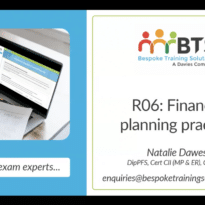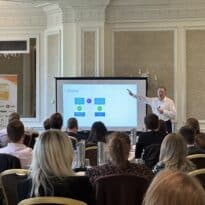Richard Cooper, Business Development and Accreditation Manager at LIBF, Fellow & retired Chartered Financial Planner, explains why paraplanners should give particular consideration to the potential vulnerability of clients and how that will change their role as automation increases.
Few healthy adults in employment would view themselves as vulnerable, that is: open to harm and in need of protection. Vulnerability, in most people’s minds, is something that only applies to the very sick, the very old, the young, or the very poor.
Not so, the FCA points out. “Anyone can become vulnerable due to health, life events, ability to withstand financial or emotional shocks, or because of poor financial or digital literacy,” says the FCA in its recent review of how financial services firms treat those in vulnerable circumstances.
Vulnerability can mean suffering financial detriment. That applies even when that person is dealing with a financial services firm that strives to meet the requirements of Consumer Duty regulation and “deliver good outcomes”. An FCA survey of consumers found that “44% of customers in vulnerable circumstances reported a negative experience with a financial services firms compared to 33% of customers not in vulnerable circumstances”.
What caused that disconnect? The FCA says that vulnerability may mean that customers have “additional or different needs and [it] may limit their ability or willingness to make decisions and choices or to represent their own interests”.
For the financial services provider, though, what a customer’s needs actually are can be a bit of a black box. That should not be the case, of course. Under the Consumer Duty rules, “Firms [have to] consider the needs, characteristics and objectives of their customers – including those with characteristics of vulnerability – and how they behave, at every stage of the customer journey. As well as acting to deliver good customer outcomes, firms will need to understand and evidence whether those outcomes are being met”.
So, firms need to find out what is really going on in someone’s life and show that they are responding appropriately to any individual needs. That can be hard to do, particularly when a lot of information is being gathered online, rather than face-to-face, and some of the details a firm really needs can be highly personal.
Evidencing compliance
Evidencing whether outcomes are being met is, clearly, central to a paraplanner’s role. But not only do they put together plans and reports, which show what a financial adviser has recommended and is carrying out, they also regularly update that information. That puts them on the front line of ensuring that the financial adviser has all the appropriate data to hand. They have to help ensure that the adviser is paying close attention to any potential for vulnerability and asking the right sorts of questions.
Not a tick-box exercise
What does the financial adviser need to look out for, and what plans and future actions should the paraplanner be recording and putting in place?
As the FCA points out, there can be times in anyone’s life when they may not be able or willing to make good financial decisions and choices, or to stand up for their own interests. This could be subtle. For example, new parents could be so overwhelmed with the demands of dealing with their first baby that they don’t have the bandwidth to manage their finances as they normally would. Equally, the mental energy of someone who has been bereaved, or who is ill, may fall short of what is needed to argue a point. They may let things slide to their detriment, even if the other party intends no harm.
To ensure that vulnerability – however fleeting – is not missed, financial advisers need pay close attention to their client, to ask the right questions, and to provide the right support. But paraplanners also need to have potential client vulnerability front of mind. They should scan existing information for anything that might indicate the need for more support and highlight that to the financial adviser. One way of helping the adviser think more broadly about potential vulnerabilities could be for the paraplanner to amass case studies that help the adviser think through potential problems.
In its recent vulnerability review, the FCA gave some examples of vulnerable customers. Some had serious mental health problems, but some might pass as having no need for support. What made many in the latter group so were standardised processes they struggled to navigate. “Greg”, for instance, finds it hard to use the internet but couldn’t get through on the ‘phone to someone who could help with a query about managing his finances, so just gave up.
As society ages, and financial services become increasingly automated, there will be many more Gregs. To ensure that clients don’t fall into the gaps between what a machine can ‘know’ and ‘understand’, and what human beings can do for others, financial services firms have to fully embrace both the letter and the spirit of Consumer Duty. And paraplanners, far more in the past, will be part of thinking hard about how best to do that.
Main image: oliver-guhr-LVaf06sV6_Y-unsplash































